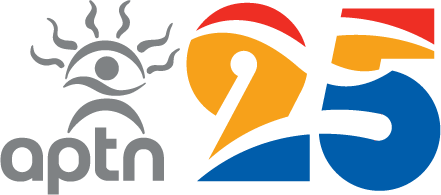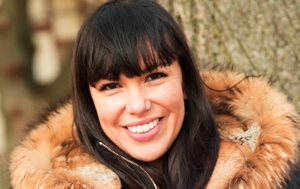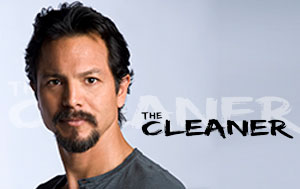Season 1
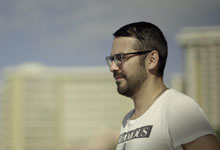
Episode 1 — Food for Thought
Daniel Anthony- Kanaka Maoli, Hawaii, USA
Daniel Anthony- Kanaka Maoli, Hawaii, USA
When Daniel Anthony asked to take his driving test in the native Hawaiian language, he was denied and told to speak English. This wasn’t the first time Daniel had been at odds with government officials in requesting respect for traditional Hawaiian matters. The outspoken 35-year-old caught the attention of the State Health Department for using traditional wood boards and stone pounders when creating a business making the traditional native Hawaiian poi. This is the story of an entrepreneur and activist of the Kanaka people.
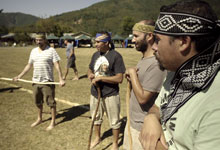
Episode 2 — Liberty Through Music
Wechekeche Ñi Trawün – Mapuche people, Chile
Wechekeche Ñi Trawün – Mapuche people, Chile
This is the story of a young Chilean Mapuche rap group finding healing through music and coming to grips with the tragic legacy of life under a dictator. Wechekeche Ñi Trawün – meaning “young people together” – fuse their musical heritage with modern urban beats in an effort to keep their ancient indigenous culture alive. History teacher Axel Paillafilu, and other founding members from Santiago, set up the organization in 2005. They hope that by mixing their ancestors’ music with contemporary urban styles (reggae ton, hip-hop, ska, rock, cumbia) they will appeal to the younger generation, awaken their people’s spirit, and make the Mapudungun language known to those who don’t speak it.
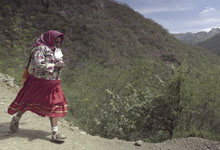
Episode 3 — Running for a Future
Prospero Torres and Catalina Rascón- Tarahumara people, Mexico
Prospero Torres and Catalina Rascón- Tarahumara people, Mexico
Isolated by some of the most savage terrain in the Americas, this is the story of how the reclusive Tarahumara continue to practice the running techniques that allow them to run hundreds of miles without rest. They traditionally ran barefoot over long distances as a ceremonial practice and competitively. These races can last anywhere from a few hours to a couple of days without a break. In this episode we tell the story of Catalina Rascón and Prospero Torres’ work to keep the traditional meaning and spiritual vibrancy of the running people alive.
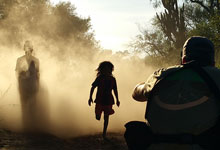
Episode 4 — What if You Could Go Back?
Taguide Picanerai- Ayoreo people, Paraguay
Taguide Picanerai- Ayoreo people, Paraguay
This is the story of Taguide Picanerai, the son of an Ayoreo Chief who is on a mission to protect the rights of his father’s people, a group still living un-contacted, in voluntary isolation. The Ayoreo are the Indigenous people of the Gran Chaco and are composed of about 5,600 members who mainly live in dense, scrubby forest in Paraguay and Bolivia. Since their first contact with white people in the 1940s, they have suffered continual invasions and many have been forced to abandon their homes due to deforestation.
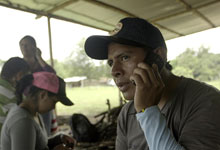
Episode 5 — To Be Silent is to Suffer
Tejido de Comunicación- NASA people, Colombia
Tejido de Comunicación- NASA people, Colombia
This is the story of a communications network and its efforts to bridge the communication gap of the Paez people, also known as the Nasa, who live in the southwestern highlands of Colombia. At Tejido de Comunicación, Alex Bilordo, Constanza Cuetia and Gearo Trochez produce radio, print, web, video and public community presentations to inform communities about issues that affect the Nasa. This is important for traditional gatherings where communities discuss and debate issues to make informed decisions.
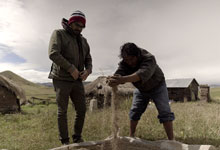
Episode 6 — A Green Revolution
Zenón Apaza- Quechua, Peru
Zenón Apaza- Quechua, Peru
This is the story of Zenón Gomel Apaza, a Quechua agronomist who advocates the use of ancient skills to improve Andean farming communities’ crop yields and ensure variety. Most Quechua live in the Andean Altiplano and rely on subsistence agriculture. After completing university studies in agronomy and returning to his home village in the Peruvian Andes, he realized that the modern farming methods he had studied didn’t match the reality of the Altiplano and often resulted in failed crops, depleted soils and dysfunctional communities.
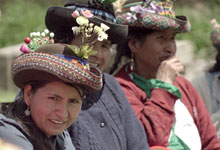
Episode 7 — Five Simple Words
Tania Pariona Tarqui- Quechua, Peru
Tania Pariona Tarqui- Quechua, Peru
Peru is caught up in a wave of environmental conflicts as extractive industries take over land that is considered traditional Indigenous territory. Recent opposition to logging and mining activities across the country resulted in the death of numerous Indigenous activists and environmental defenders. Among those brave enough to fight for the livelihoods of Indigenous communities is Tania Pariona Tarqui. In this episode, we follow the plight of a young Quechua woman who has successfully bridged education with traditional knowledge to fight for Indigenous peoples’ rights.
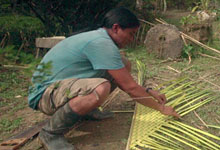
Episode 8 — The Return of the Storyteller
Eriberto Benedicto Gualinga- Sarayaku, Ecuador
Eriberto Benedicto Gualinga- Sarayaku, Ecuador
Residing in the central Ecuadorian Amazon, the Sarayaku community comprises around 1,200 Indigenous people who boast one of the most successful histories of defending their land from resource extraction. Last year marked a new chapter in their story; after over a decade of relentless struggle for the recognition of years of human rights violations, the Sarayaku received an official apology from the State. Through the lens of this episode’s champion Eriberto, we will witness the far-reaching impacts of the destructive and unjust activities on his peoples’ territory and learn how the Sarayaku are rising up together to reject the development of oil activities in their community.
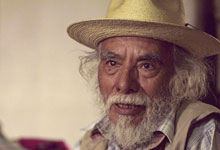
Episode 9 — Fire Within Us
Felipe Gomez- Ajq’ij Maya K’iche, Guatemala
Felipe Gomez- Ajq’ij Maya K’iche, Guatemala
This is the story Felipe Gomez, a spiritual guide and leader of the Mayan alliance Oxlaljuj Ajpop. His mission: to fight for the recovery of Mayan sacred sites for Indigenous peoples through the implementation of “The Law of Holy Places of Indigenous Peoples”- a law to grant indigenous communities the right to manage their sacred sites. However, the State and companies expropriate many sacred sites in the Guatemalan highlands, because they are found in areas marked for road construction, housing, tourism or conservation. What’s more, as tourists flock to visit various sites, Mayan priests and healers are often denied entry by the government.
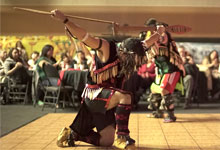
Episode 10 — Awakening a Generation
Ta’Kaiya Blaney- Sliammon people, Canada
Ta’Kaiya Blaney- Sliammon people, Canada
In this episode we follow a day in the life of a young activist from the Sliammon First Nation in British Columbia, preparing for an event, juggling school and learning the ways of her people from her grandparent mentors. We weave the narrative between the three storylines and ultimately showcase the “old-age wisdom” Ta’Kaiya displays.
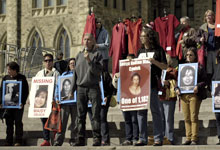
Episode 11 — I Am Missing
Bridget Tolley- Algonquin, Ontario, Canada
Bridget Tolley- Algonquin, Ontario, Canada
On October 5, 2001, Bridget Tolley’s life took a drastic turn when her mother, Gladys Tolley, was struck and killed by a Sureté du Québec police cruiser on a two-lane highway near her home. As she searches for justice for her mother she, in turn, inspires other families to speak out against the systematic violence against Aboriginal women. This Algonquin grandmother of five is also the co-founder of Sisters in Spirit – a grassroots movement to raise public awareness about the issue of murdered and missing Indigenous women. The annual event is held on October 4th with over 200 communities across Canada participating.
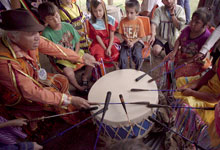
Episode 12 — All My Relations
Mike Doucette – Mi’kmaq, Nova Scotia, Canada
Mike Doucette – Mi’kmaq, Nova Scotia, Canada
Pakesso kicks back with Mike in Nova Scotia, a spiritual healer who turned to traditional healing methods in his battle against alcoholism and cancer. In a bid to relieve Indigenous communities of the social problems they are afflicted with, Mike works with community elders to organize sweat lodges and encourage people to embrace the Mi’kmaq culture and ceremonies. This episode explores one man’s incredible plight to win back the physical, emotional and spiritual wellbeing of his people.
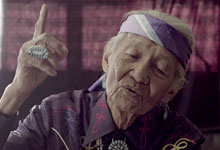
Episode 13 — Nation to Nation
Klee Benally – Dine (Navajo), Arizona, USA
Klee Benally – Dine (Navajo), Arizona, USA
Klee Benally (Diné/Russian-Polish) was born in Tuba City on the Diné (Navajo) Nation and currently lives in Flagstaff, Arizona. He is originally from Black Mesa and, for most of his life, has been on the frontline in struggles to protect Indigenous sacred lands. He is a multi-disciplinary artist and fights, in every aspect of his work, for a livable and healthy world. He works with youth and uses art to help them redefine their own image in mainstream media. Klee doesn’t believe that the current dominant social order (i.e. “colonial system”) can be fixed but should (and will be) smashed to pieces.
